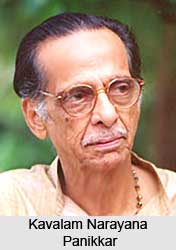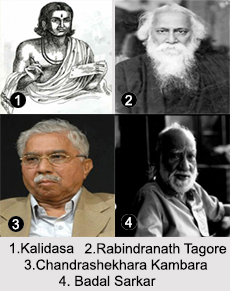 Kavalam Narayana Panikkar was a Malayalam theatre personality. He was born in Kavalam village, Alappuzha district in 1928. Kavalam Narayana Panikkar started composing poetry while quite young, graduated in law from the University of Madras, and practiced from 1955 to 1961. Kavalam Narayana Panikkar worked as secretary of the Kerala Sangeetha Nataka Akademi for the next ten years. He also founded the groups Koothambalam in Alappuzha, and Tiruvarangu and its parent centre Sopanam in Thiruvananthapuram. His inventive genius displayed such dynamism that orthodox critics referred to him as a poet with queer ideas about theatre. The rhythmic body movements he freely employed as effective mediums of expression generated an experience so striking that these critics derisively called them attempts to convert the stage into an athletic field. Kavalam Narayana Panikkar often centres his plays on existing or invented myths and parables.
Kavalam Narayana Panikkar was a Malayalam theatre personality. He was born in Kavalam village, Alappuzha district in 1928. Kavalam Narayana Panikkar started composing poetry while quite young, graduated in law from the University of Madras, and practiced from 1955 to 1961. Kavalam Narayana Panikkar worked as secretary of the Kerala Sangeetha Nataka Akademi for the next ten years. He also founded the groups Koothambalam in Alappuzha, and Tiruvarangu and its parent centre Sopanam in Thiruvananthapuram. His inventive genius displayed such dynamism that orthodox critics referred to him as a poet with queer ideas about theatre. The rhythmic body movements he freely employed as effective mediums of expression generated an experience so striking that these critics derisively called them attempts to convert the stage into an athletic field. Kavalam Narayana Panikkar often centres his plays on existing or invented myths and parables.
They have the concentration, suggestion, and metaphorical dimension of a poem. Some of Kavalam Narayana Panikkar`s main works can be named as Sakshi i.e. `Witness` in 1964, Daivattar or `God-man` in 1973, Tiruvazhithan in 1974, Avanavan katampa or `Self as the Obstacle` in 1975, Ottayan or `The Lone Tusker` in 1977, Karimkutty in 1983, Aram i.e. `Sacrificial Firewood` in 1989, Teyyateyyam or `Spirit of the Spirit` in 1991, and Poranadi or `Outsider` in 1995. Although rooted in Kerala`s heritage and the Natyashastra, Kavalam Narayana Panikkar absorbed various trends in world theatre, recreating them. He also translated drama from English to Malayalam. In 1988, Kavalam Narayana Panikkar wrote the film script of Marattam or Masquerade for eminent director G. Aravindan, based on his own play about a Kathakali performer`s identification with his role.
Kavalam Narayana Panikkar is an adept in all traditional and ritualistic forms from Kerala. Panikkar employed new rhythms in his stylized, often poetic and musical, dialogues with the result that his drama combined music, dance, and literature. Kavalam Narayana Panikkar explored Kalaripayattu martial art and classical genres like Kathakali and Kutiyattam imaginatively, to give appropriate shape to visual communication and to accentuate auditory impressions. Kavalam Narayana Panikkar related the splendor of Sanskrit theatre to the ingenuity of folk and tribal theatre. The Sanskrit classics he directed in this style include Bodhayana`s Bhagavadajjukiya in 1976, Bhasa`s Madhyamavyayoga in 1978, Dutavakya in 1980, Urubbanga in 1983, and Karnabhara in 1984, and Kalidasa`s Vikramorvasiya in 1981 and Abhijnana-Sakuntala in 1982. They revolutionized the staging of classical drama in India. Some of them toured abroad. Kavalam Narayana Panikkar also gave a new orientation to Mohiniyattam dance by introducing Kerala`s traditional Sopana music and rhythm patterns.




